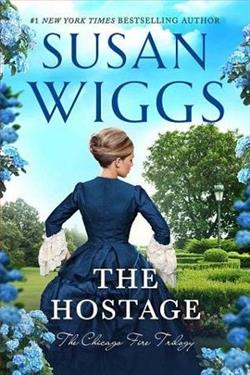Summary

The Hostage
by Susan Wiggs
Chicago, 1871
Deep within the quiet of the night, a city erupts into flames, and a spoiled heiress is soon whisked away.
Deborah Sinclair is a beautiful, accomplished young heiress with a staggering dowry. But her fortune does her no good when, one horrible night, Chicago is engulfed in flames.
Tom Silver will walk through fire to avenge a terrible injustice—and he may have to. But when he makes Deborah a pawn in his revenge, the heat of the inferno fades next to the attraction he feels for his captive. And the further he takes her from everything she's known, the stronger their passion grows, until it threatens to consume them both.
.
Read
The Hostage on http://kissnovel.net
Martial Peak Reviews
In Susan Wiggs' historical romance novel The Hostage, set against the backdrop of the catastrophic Great Chicago Fire of 1871, readers are taken on a tumultuous journey of love, revenge, and self-discovery. The narrative unfolds in a city that is not only burning but also teeming with the complexities of human emotions and societal expectations. Wiggs masterfully intertwines the personal struggles of her characters with the larger historical context, creating a rich tapestry that captivates the reader from the very first page.
The story revolves around Deborah Sinclair, a young heiress whose life is turned upside down when the city she knows and loves is engulfed in flames. Deborah is portrayed as a beautiful and accomplished woman, yet her privileged status does little to shield her from the chaos that ensues. The fire serves as a powerful metaphor for the destruction of her old life and the rebirth that follows. As she is whisked away from the inferno, readers are drawn into her internal conflict—she is torn between her sheltered upbringing and the harsh realities of the world outside her opulent existence.
On the other side of the narrative is Tom Silver, a man driven by a desire for vengeance. His character is complex; he is not merely a villain but a man shaped by his past experiences and injustices. Tom's motivations are deeply rooted in a personal tragedy, and as he takes Deborah hostage, readers are left to grapple with the moral ambiguity of his actions. The dynamic between Tom and Deborah is electric, filled with tension and an undeniable attraction that grows as they navigate the perilous circumstances surrounding them.
Wiggs excels in character development, allowing both Deborah and Tom to evolve throughout the story. Deborah's transformation from a sheltered heiress to a woman who begins to understand her own strength and desires is compelling. She is not just a pawn in Tom's game of revenge; she becomes an active participant in her own fate. This evolution is mirrored in Tom, who, through his interactions with Deborah, begins to confront his own demons and reconsider the path he has chosen. Their relationship is a dance of power and vulnerability, and it is this interplay that makes their connection so captivating.
The themes of love, revenge, and redemption are intricately woven into the narrative. The fire that serves as the backdrop is not only a physical destruction but also a catalyst for change. It forces the characters to confront their pasts and make choices that will define their futures. The novel explores the idea that true love can emerge from the ashes of pain and suffering, and that sometimes, the most profound connections are forged in the most unlikely circumstances.
Wiggs also delves into the societal expectations of the time, particularly regarding gender roles and class distinctions. Deborah's journey is not just about her relationship with Tom; it is also about her struggle for autonomy in a world that seeks to define her by her wealth and status. The author paints a vivid picture of 19th-century Chicago, highlighting the stark contrasts between the lives of the wealthy and the struggles of the less fortunate. This social commentary adds depth to the story, making it not just a romance but a reflection on the human condition.
In terms of pacing, The Hostage maintains a steady rhythm that keeps readers engaged. The tension builds as Deborah and Tom navigate their complex relationship, and the stakes are heightened by the external chaos of the fire and its aftermath. Wiggs skillfully balances moments of intense emotion with lighter, more tender scenes, allowing readers to experience the full spectrum of the characters' journey.
Comparatively, readers who enjoy historical romances with strong character development may find parallels with works by authors such as Lisa Kleypas and Julia Quinn. Like Wiggs, they create rich historical settings and complex characters whose relationships evolve in meaningful ways. However, Wiggs distinguishes herself by incorporating a significant historical event that shapes the narrative, adding layers of urgency and depth to the story.
Overall, The Hostage is a compelling read that combines romance, historical context, and character growth in a way that resonates long after the last page is turned. Susan Wiggs has crafted a tale that is both heart-wrenching and uplifting, exploring the transformative power of love amidst chaos. The novel invites readers to reflect on their own lives and the choices they make, reminding us that even in the darkest of times, hope and love can emerge from the ashes.
For those interested in a story that intertwines passion with historical significance, The Hostage is a must-read. It is a testament to the resilience of the human spirit and the enduring power of love, making it a standout addition to the genre of historical romance.






![The Countdown of My Death is Spamming My Status Window [Official]](/upload/pic/manga/the-countdown-of-my-death-is-spamming-my-status-window--official-.jpg)

















Reviews 0
Post a Reviews: